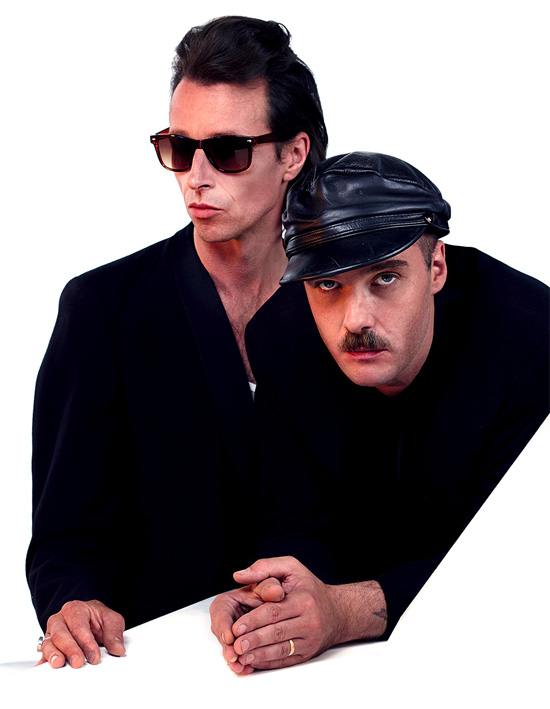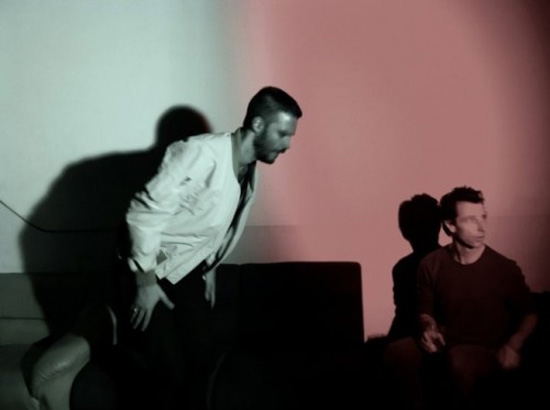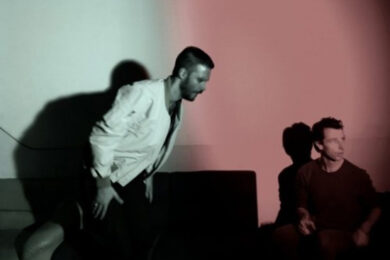Conrad Standish wears a leather cap as a wardrobe staple, has a moustache, a bold personality and a droll sense of humour. These character traits work their way into his music: in the same way that the forward-slash of his new band Standish/Carlyon marks the separation between members into opposing hemispheres – Standish until recently based in London; his long time collaborator in Devastations, Tom Carlyon, in Melbourne – the duo has a personality, and by extension a sound, of contrasts. A playful mix of camp New Romanticism and blue-eyed soul, bled through the clammy darkness of its muscular dub and noise influences, there’s a sardonic edge to Deleted Scenes that is both cynical and joyful; serious, yet aloof.
Standish himself is incredibly well spoken, if obstructed by the occasional block or prolongation, hugely confident and really quite funny, in a deadpan kind of way. He’s the kind that can be intimidating in a lot of ways, too, a bit like his wife – who happens to be Jonnine Standish of post-industrial duo HTRK. Equally sharp and quite candid, he too boasts an impressive repertoire involving working, touring and sometimes living with members of some eminent outfits, Einstürzende Neubauten and Liars included. Standish counts the latter’s Angus Andrew as a close friend, and contributed to their seminal 2006 album Drum’s Not Dead.
Indeed, you can hear echoes of Liars in the muted cadence and drunken, high-pitched vocal repetition of Standish/Carlyon’s ‘New People’, while the skittering beats of ‘Critics Multiply’ resemble the liquid shade of HTRK. Elsewhere, images of "chocolate Labradors in Tokyo" and "ultraviolet gloom" hover through a surreal listing of track titles like ‘Gucci Mountain’ and ‘Nono/Yoyo’, while Standish takes a perverse pleasure in indulging his soft rock proclivities with alto vocal pitches and flouncing bass lines; a smacky Boy George for the post-Ariel Pink generation. With Deleted Scenes released this week, the Quietus caught up with Standish over Skype to discuss the album’s creation.
Do you think your influences will change, now that you’ve spent some time in Melbourne?
Conrad Standish: I don’t know. One thing that I’ve noticed, living here again after a long absence, is that it is very much a different aesthetic creatively, in all kinds of ways. It’s worlds apart from London, and I guess most of this album was made in London, so that’s what I was really vibing off then, in a way. But whether I’m really taking a lot out of my time here, it could be on a subconscious level but… it’s a friendlier vibe here in Melbourne, but that doesn’t necessarily interest me.
I’d imagine the reactions to Deleted Scenes would vary between Australia and the UK. Culturally, dub is more popular in London; new wave and the new romantics are more acceptable.
CS: I don’t feel like we necessarily fit in here but then, at the same time, I don’t know if we would in London either. We feel like outsiders, to a certain extent.
It’s interesting that dub is a big influence for you, because when interviewing Jon and Nigel [Yang, both of HTRK] at your old flat, I could hear it through the window. It’s a pervasive force.
CS: Yeah, that was a huge influence on me, and I guess I was always into dub or whatever, but it really took moving to London to just have it in all my pores, as it were.
Do you think that environment has an impact on the type of creativity of a specific place?
CS: I remember talking about something similar to this, years ago with a friend of mine in London. We were using the analogy quite a lot that in London the music is quite nervous, quite uptight, intense and wiry and all that. We thought it could be that it’s a tiny island, there’s no room to move, etc… whereas in Australia, it’s huge. There’s loads of room to move and, I guess, Australians make the exact opposite kind of music. It’s very expansive, there’s lots of use of silences. Even the way that people will play the guitar. An Englishman will, more often than not, wear it higher up on the body and play it in a jerky manner, while, in Australia, they’ll play it kind of low-slung, swinging it around, like there’s all the room in the world.
You mention the surrealist angle of Standish/Carlyon and it comes across as absurd at times. It’s quite funny.
CS: I’m glad you can pick up on the humour. It’s definitely intended for that to come across. Whether or not you find it humorous, you are supposed to know that it’s there.
(feature continues below image)

That press shot, where someone on an Australian site colourfully described you as "gay bikie Hitler" – how did that imagery come up? That too seems a bit tongue-in-cheek. Unless that is what you like to wear.
CS: Well, I wear that leather hat almost every day. Anyone who knows me will tell you the same. So, while it is visually a very, I guess, homoerotic shot, that’s probably only because of my proximity to Tom and the fact that I am wearing a leather hat. You probably don’t usually see a man sitting that close to another man in real life when one of them is wearing a leather hat.
And a moustache.
CS: I’ve had a moustache for years, as well. So, yeah, that really is a very accurate visual depiction of what I look like, but it’s just not that I’m always that close to Tom. I’m not doing it for a joke but I guess, to make it a little more clear, I’ve had this common thing that I think a lot of boys – if their father had a beard or moustache – it’s quite common do that to feel closer to their father. Then about three years ago, I found that leather hat at work. I was working at a second hand clothes shop in London and that hat showed up, I put it on and I thought, ‘oh my god, I look super fucking camp. It’s kind of funny.’ So I wore it for the rest of the day. I got a great reaction and I was like, ‘fuck it, I’m going to wear this hat’. So I left work in it, went to the pub in it and I was like, ‘yeah, this hat could be a new thing for me’. So it was a gradual thing and now I’ve ended up as a ‘leather hat and moustache dude’. God, that was such a long-winded way of telling you.
Having got that leather hat in London, do you think there’s that element of eccentricity that allows you to be more expressive there?
CS: Oh yes, absolutely. It’s less conservative in England. You do feel a little bit freer over there, which is a funny thing to say because usually you think of England to be a haughty and uptight kind of vibe. It’s far haughtier over here [in Australia].
It’s obvious that your experience affects how you create, but do you think your music might have been very different if you hadn’t moved to London?
CS: Yeah, but on our last Devastations album we were leaning towards a lot of this vibe as well, and at that point I’d never lived in London. I’d only lived in Berlin at that point. I can’t say that London shaped this album like, 100 per cent, because Tom’s contributions to the record, by and large, were in Melbourne. So he would send over a beat, I’d overdub a bass line and he’d overdub a guitar part or a synth thing… so it’s also half Australian. But I guess, yeah – how can I phrase this a little more eloquently… – while I can’t say London hasn’t influenced certain aspects of the album, I think it’s too simplistic to attribute too much of it to geography.
I was going to say what perhaps distinguishes you from the occasional James Blake comparison I’ve seen online…
CS: Oh fuck no, see, that’s awful. The last thing I want is for anyone to think that. They have it totally wrong. That’s horrible.
It’s a weird comparison to make, but obviously people work within an existing schema that they understand. But what I wanted to say was what distinguishes Standish/Carlyon from that kind of music is that expansive sound. They’re not so frenetic as someone like James Blake or Mount Kimbie or whatever.
CS: Yeah, well, perhaps that comes down to the fact that we’re Australian, which brings it full circle. I definitely think that Australians tend to write with silence in mind, just as much as any other instrument and we’re certainly always aware of that but that’s like an instinct thing, I think, with us. That’s just inbuilt.
That silence thing is an interesting point. I do feel like that’s something that isn’t utilised that much here.
CS: Well, James Blake should certainly utilise a little bit more of it, a fucking whole lot of it. [laughs] I’m just going to pour myself a glass of wine. Is that all right?



